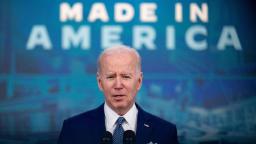
(CNN)President Joe Biden is due to travel to Fort Worth, Texas, Tuesday, where he is expected to meet with veterans and discuss a newly proposed federal rule that would add certain rare respiratory cancers to the list of disabilities considered associated with military service .
It’s a topic very close to the President. Biden has said he believes cremation pits may have caused the brain tumor that killed his son Beau – an Iraq War veteran who died in 2015 – but has noted he “can’t prove it yet.” Biden has pledged to fund research into the long-term effects of exposure to fire pits. Beau Biden’s cancer would not be caught by the proposed rule, but the president has made it clear that supporting veterans and fighting cancer will be an important part of his administration’s agenda.
The visit is part of the White House’s focus on the new unity agenda unveiled by the President in his State of the Union address last week. The plan has four pillars: fighting the opioid epidemic, fighting mental health, supporting military veterans and ending cancer.
According to the White House, Biden “will be speaking with veterans, caregivers and survivors about addressing the health impacts of environmental exposures like fire pits.” He will also visit the Fort Worth Veterans Affairs Clinic for a referral from doctors. And the president will cap his trip by making remarks “on expanding access to health care and benefits for veterans affected by environmental exposures during military service,” the White House says.
Incineration pits have been used to incinerate all types of waste, hazardous materials, and chemical compounds at military sites in Iraq and Afghanistan. 86 percent of post-9/11 veterans who served in Iraq or Afghanistan say they have been exposed to cremation pits, according to a 2020 survey by the nonprofit Iraq and Afghanistan Veterans of America.
During last week’s State of the Union address, Biden cited “inhalation of toxic smoke from fire pits” as one of the many dangers facing US troops in Iraq and Afghanistan.
“And they came home, many of the fittest and best-trained warriors in the world, never the same. Headache. Deafness. Dizziness. One of those soldiers was my son Maj. Beau Biden. I’m not sure if the burn pit he lived near, near where his hooch was in Iraq – and before that in Kosovo – the cause of his brain is cancer – the diseases of so many of our troops. But I’m anxious to find out everything we can.”
Following the president’s direction last November to complete a review of rare cancers and make recommendations on whether they are linked to military service, the Department of Veterans Affairs announced last week that it would propose a rule identifying nine rare respiratory cancers as add service-related disabilities for veterans who have served for a period of time in what the agency calls “the Southwest Asia theater of operations.”
Veterans Affairs Secretary Dennis McDonough will visit Fort Worth with the President, the White House said Monday.
The VA said last week that qualifying veterans whose claims were previously denied will be encouraged to submit new or supplemental claims once the rulemaking process is complete.
In 2016, while serving as vice president, Biden launched a federal cancer moonshot initiative, and he resumed the effort about a year after returning to the White House.
In addition to discussing the new federal rule, Biden will “request Congress to send them legislation that will ensure we honor our commitment to veterans exposed to toxic substances,” White House Press Secretary Jen Psaki said during the news conference on Sept Monday.
Last week, the House of Representatives passed the Honoring our Promise to Address Comprehensive Toxics Act of 2021, which addresses several issues related to veterans who were exposed to toxic substances while serving in the military. The bill is now before the Senate.
CNN’s Paul LeBlanc and Donald Judd contributed to this report.
Add Comment